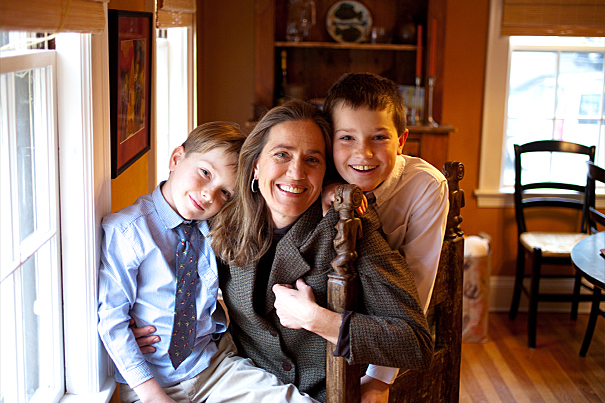
Harvard history professor Caroline Elkins balances her intense academic life with family life. Here she is with sons Jake, 7, and Andy, 9, in their Cambridge home.
Rose Lincoln/Harvard Staff Photographer
Hard look at harsh times
Caroline Elkins analyzes colonial behavior in African independence
Back just three days from a trip to Kenya, colonial era historian Caroline Elkins was thinking about the present and the future, and not just her specialty, the past.
Elkins, who was named professor of history at Harvard last July, had spent several days in January in the East African nation, talking with officials and potential donors as part of her efforts to design and secure study abroad opportunities and internships for Harvard undergraduates in Africa.
Though opportunities for overseas study have proliferated at Harvard in recent years, Africa is still underrepresented, Elkins said. This is a problem, she said, at a time when student interest in the continent — in its languages, people, history, and modern challenges — is growing.
“By and large, my compass is what students want,” Elkins said. “So if we don’t respond, we should go home. That’s what we’re here for.”
Elkins has spent a lot of time in Kenya. She’s an authority on post-colonial violence, particularly involving the British against independence-minded Kenyans during the Mau Mau uprising in the 1950s. Her book “Imperial Reckoning: The Untold Story of Britain’s Gulag in Kenya” won the Pulitzer Prize for general nonfiction in 2006. Elkins conducted hundreds of interviews and sifted through mountains of paperwork in compiling the book, a process in which she is again engaged for her next project: an examination of the broader process of decolonization that the British Empire went through after World War II.
For her latest project, Elkins has traveled extensively to former British colonies, including the old Palestine and Malaya, as well as Zimbabwe and South Africa, and London. Though power structures, and their dismantling, are important in telling the story, Elkins is just as interested in the people who populated those structures. She is interested in what life was like in those times, but also in the influence of unheralded individuals, such as British officers active in counterinsurgency operations. These men traveled from colony to colony and may have spread repressive techniques across the disintegrating empire, ultimately influencing even American strategies in Vietnam.
Elkins’ passion for history began young. She grew up in New Jersey and remembers being fascinated with how things were different 100 years earlier and how they evolved to now. She was particularly interested in people’s roles, and how the ordinary stresses of life affected decisions that might have far-reaching consequences.
As an undergraduate at Princeton University, she took an African history course, traveled to the continent, and was hooked. After graduating, she worked on Wall Street and then entered graduate school at Harvard. “Imperial Reckoning” grew out of her doctoral work on the history of women in Kenya. While conducting that, she came across horrible stories of women detained in a British camp system that she had never heard about. She finished the book while a fellow at the Radcliffe Institute for Advanced Study, and was the Hugo Foster Associate Professor of African Studies when “Imperial Reckoning” was published.
In addition to her research and teaching responsibilities, Elkins serves as chair of the Committee on African Studies, a University-wide body responsible for coordinating Africa-related activities. As chair, Elkins said, she feels a responsibility to increase the opportunities for African scholarship for students, which has drawn support from Harvard’s administration. She is collaborating with the African and African American Studies Department and the Du Bois Institute for African and African American Research. She’s also working with the Kenya National Museum and the Kenya Oral History Center, which she co-directs, to augment the history wing of the Kenya National Museum, which was renovated a few years ago.
“It’s fabulous, beautiful. They did a great job, but the din of silence from the history wing is notable,” Elkins said.
Elkins is hoping that Harvard students can play a role in furnishing the exhibit, and fostering exchanges that have Kenyan scholars coming to the University. Between her research and her efforts at building academic collaborations with Kenyan institutions, Elkins logs a lot of airplane time. Though modern technology has brought the world closer, there is still no substitute for face-to-face meetings to get things done, she said.
“At the end of the day, the whole point is to get students there in a more systematic kind of way,” Elkins said.




